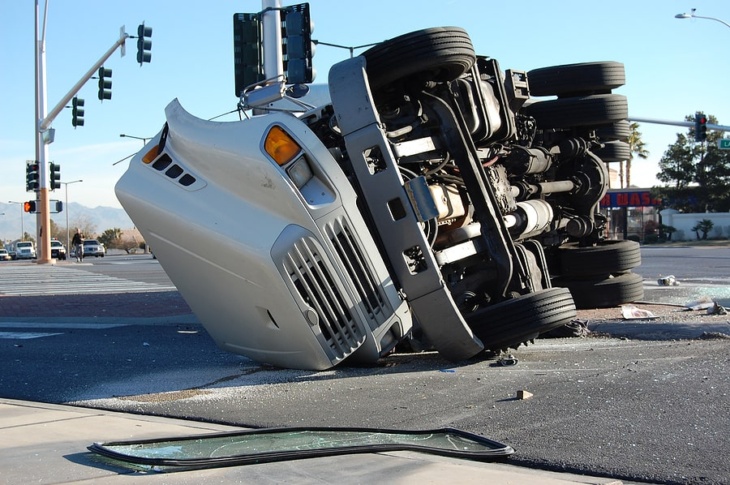What to Do After a Truck Rollover Injures You

Rollovers involving tractor-trailers, semi-trucks, and other trucks not only block the roadway and cause traffic jams but also result in catastrophic injuries and deaths. According to the
Insurance Institute for Highway Safety (IIHS), 47 percent of deaths in large truck accidents in 2019 occurred in crashes where a vehicle rolled over.
Trucks have a higher center of gravity, which means they are more prone to rolling over than passenger cars. That is why truck drivers should always take extra care when operating their vehicles, especially when performing dangerous maneuvers such as turns and lane changes. When drivers fail to uphold their duty of care to operate trucks in a safe manner, accidents are bound to happen.
If you or someone you love sustained injuries in a truck rollover accident, consider contacting a
truck accident attorney to explore your options for compensation and hold at-fault parties, including a truck driver and his/her trucking company, accountable for your injuries and financial losses.
Causes of Truck Rollovers
There are a variety of factors that contribute to truck rollovers. In the vast majority of cases, rollover accidents are preventable through the use of ordinary care and careful operation of vehicles.
Some of the most common causes of truck rollovers include:
- Sudden maneuvers. Because trucks have a higher center of gravity, sudden swerving maneuvers, lane changes, or turns increase the risk of rolling over. For this reason, drivers of large trucks must steer clear of performing sudden maneuvers as much as possible.
- Driving too fast for conditions. Excessive speed is one of the most common causes of truck rollovers in the United States. Truck drivers often travel at a speed higher than is reasonable for safe driving in order to reach their destination faster. However, driving at a higher rate of speed increases the risk of a rollover, especially when traveling on curves or steep inclines and declines.
- Sharp curves. Many roads have sharp curves that make it more difficult for large vehicles to maneuver safely. Navigating sharp curves is a challenging task for trucks, especially when carrying large loads of cargo.
- Overloaded trailers. Trailers are designed to carry loads up to a specific limit. Thus, trucks with overloaded trailers or improperly secured loads are more likely to roll over because too much cargo can raise the otherwise high center of gravity.
- Tire blowout. A truck driver is likely to lose control of the vehicle when a tire blowout occurs, especially if the truck is traveling at high speeds. As a result, a trucker may need to perform sudden maneuvers, which can lead to a rollover accident.
- Driver’s negligence. As mentioned earlier, the vast majority of rollovers can be prevented through the careful operation of the truck. Unfortunately, not all truck drivers exercise reasonable care when operating these large vehicles. Many of them drive too fast for conditions, fail to yield the right of way to other drivers, get distracted behind the wheel, drive under the influence of alcohol or drugs, and engage in other forms of negligence and recklessness.
Regardless of what caused the truck rollover, a victim is entitled to compensation if someone else is responsible for causing the accident.
Injuries in Truck Rollover Accidents
Rollovers involving large trucks often result in life-threatening and catastrophic injuries. According to the National Safety Council (NSC), trucks are responsible for 160,000 injuries every year. Occupants of other vehicles account for more than two-thirds of those injuries (69 percent).
Some of the most common types of injuries suffered by victims of truck rollovers include:
- Traumatic brain injuries (TBIs)
- Spinal cord injuries, including paralysis
- Loss of a limb
- Disfigurement
- Broken bones
- Internal organ damage and bleeding
- Torso and rib injuries
- Back and neck injuries
- Knee injuries
- Cuts and lacerations
The medical expenses associated with injuries resulting from truck rollovers can cause financial hardships to the victim and their family.
How to Prove a Truck Driver’s Negligence in Rollover Accidents?
When seeking compensation for your injuries after a truck rollover accident, you need to prove negligence on the part of the truck driver, their employer (trucking company), or other parties.
When filing a personal injury claim against the truck driver or their employer, you and your attorney need to establish:
- Duty of care. The defendant (e.g., the truck driver) owed you a duty of care to exercise reasonable care.
- Breach. The truck driver breached the duty because of their failure to exercise reasonable care (e.g., the driver was driving too fast for conditions or made an unsafe maneuver on the road).
- Causation. The truck driver’s negligence resulted in the truck rollover accident, which caused your injury.
- Damages. You suffered damages as a result of your injury (e.g., medical expenses, loss of income, and others).
A trucking company may also be liable for the rollover if there is evidence that it was at fault for the accident due to negligent hiring, inadequate supervision, improper maintenance of the vehicle, or other forms of negligent or careless conduct.
Recoverable Damages in Truck Rollovers
If you suffered injuries in a truck rollover, you might be entitled to recover damages from the at-fault party. Your recoverable damages will most likely include compensatory damages such as economic and non-economic losses. Depending on the circumstances of the accident, you might recover punitive damages.
Common types of damages that are available to victims of truck accidents are:
- Medical expenses
- Loss of income, including future lost wages
- Property damage
- Diminished earning capacity
- Disfigurement
- Mental anguish
- Loss of enjoyment of life
- Pain and suffering
Under
735 ILCS 5/13-202, injured victims in Illinois are entitled to punitive damages to punish the defendant for their gross negligence, recklessness, or willful or wanton conduct.
How Can a Truck Rollover Attorney Help?
Consider contacting a skilled attorney if you or your loved one was injured in a truck rollover accident.
An attorney may:
- Investigate the accident to determine liability
- Gather evidence proving the other party’s fault
- Offer legal advice throughout your legal case
- Handle all communications with the insurance company
- Fight for a fair settlement offer
- Represent your interests in court
A knowledgeable and results-driven attorney can help you secure the compensation you need to move forward with your life.
Adam B. Lawler
Attorney at Law / Partner
Adam Lawler is the founder of Lawler Brown. Adam is a 2004 graduate of Saint Louis University School of Law. Adam worked for a local firm until founding the Lawler Brown in 2009. Adam’s practice areas focus in Personal Injury, Business, Real Estate, Probate/Trust/Estate Administration and general litigation.
Author's Bio
 Rollovers involving tractor-trailers, semi-trucks, and other trucks not only block the roadway and cause traffic jams but also result in catastrophic injuries and deaths. According to the Insurance Institute for Highway Safety (IIHS), 47 percent of deaths in large truck accidents in 2019 occurred in crashes where a vehicle rolled over.
Trucks have a higher center of gravity, which means they are more prone to rolling over than passenger cars. That is why truck drivers should always take extra care when operating their vehicles, especially when performing dangerous maneuvers such as turns and lane changes. When drivers fail to uphold their duty of care to operate trucks in a safe manner, accidents are bound to happen.
If you or someone you love sustained injuries in a truck rollover accident, consider contacting a truck accident attorney to explore your options for compensation and hold at-fault parties, including a truck driver and his/her trucking company, accountable for your injuries and financial losses.
Rollovers involving tractor-trailers, semi-trucks, and other trucks not only block the roadway and cause traffic jams but also result in catastrophic injuries and deaths. According to the Insurance Institute for Highway Safety (IIHS), 47 percent of deaths in large truck accidents in 2019 occurred in crashes where a vehicle rolled over.
Trucks have a higher center of gravity, which means they are more prone to rolling over than passenger cars. That is why truck drivers should always take extra care when operating their vehicles, especially when performing dangerous maneuvers such as turns and lane changes. When drivers fail to uphold their duty of care to operate trucks in a safe manner, accidents are bound to happen.
If you or someone you love sustained injuries in a truck rollover accident, consider contacting a truck accident attorney to explore your options for compensation and hold at-fault parties, including a truck driver and his/her trucking company, accountable for your injuries and financial losses.
